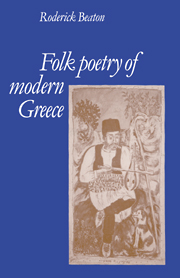Book contents
- Frontmatter
- Contents
- Preface
- Maps
- 1 INTRODUCTION
- 2 THE DEMOTIC TRADITION: THE SONGS
- 3 STRUCTURE OF THE DEMOTIC TRADITION: THE FORMULA
- 4 STRUCTURE OF THE DEMOTIC TRADITION: IMAGERY AND THEMES
- 5 THE EMERGENCE OF THE DEMOTIC TRADITION
- 6 FUNCTION OF THE DEMOTIC TRADITION: THE SONGS AND HISTORY
- 7 THE SONGS AS MYTH
- 8 ONE TRADITION OR SEVERAL?
- 9 THE HISTORICAL TRADITION
- 10 GREEK FOLK POETRY AND WRITING
- Notes
- Glossary of Greek words transliterated in the text
- Bibliography
- Index
8 - ONE TRADITION OR SEVERAL?
Published online by Cambridge University Press: 13 September 2009
- Frontmatter
- Contents
- Preface
- Maps
- 1 INTRODUCTION
- 2 THE DEMOTIC TRADITION: THE SONGS
- 3 STRUCTURE OF THE DEMOTIC TRADITION: THE FORMULA
- 4 STRUCTURE OF THE DEMOTIC TRADITION: IMAGERY AND THEMES
- 5 THE EMERGENCE OF THE DEMOTIC TRADITION
- 6 FUNCTION OF THE DEMOTIC TRADITION: THE SONGS AND HISTORY
- 7 THE SONGS AS MYTH
- 8 ONE TRADITION OR SEVERAL?
- 9 THE HISTORICAL TRADITION
- 10 GREEK FOLK POETRY AND WRITING
- Notes
- Glossary of Greek words transliterated in the text
- Bibliography
- Index
Summary
The demotic tradition which we have so far been considering was defined in the first chapter as a body of folk songs sharing a specific and consistent structure and function. But this tradition, although made up of a great variety of songs, is not synonymous with the whole corpus of Greek folk poetry. There is no lack of material in Greek which falls within the more general definitions of folk poetry, or oral tradition, and yet whose structure and function are significantly, different from those of the songs we have been discussing up till now. To regard these as belonging to separate traditions is not, I believe, to impose an arbitrary system of classification. It would be naive to suppose that folk poetry need be uniform, any more than literary poetry; and it is possible to see how, despite a degree of assimilation, traditions of different function and structure are decisively separated within one culture.
Once it is recognised that folk poetry need not be homogeneous but may consist of differently motivated traditions, the kind of diachronic analysis which proved to be impracticable within a tradition again becomes possible. That is to say, any attempt to date individual songs and account for their derivation in terms of cause and effect is doomed to failure because of the complex system of interrelations which give the demotic tradition its unity and internal consistency, but a tradition as a whole, and the relation between the traditions, may still be treated historically, as was attempted for the demotic tradition in Chapter 5.
- Type
- Chapter
- Information
- Folk Poetry of Modern Greece , pp. 136 - 150Publisher: Cambridge University PressPrint publication year: 1980

